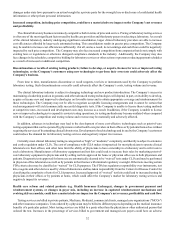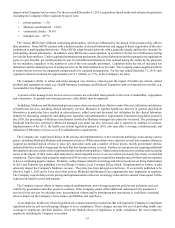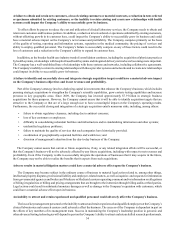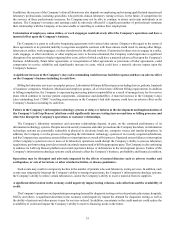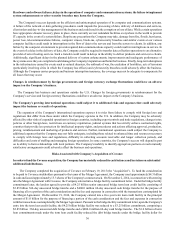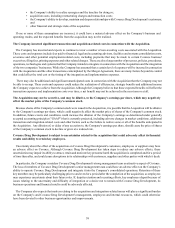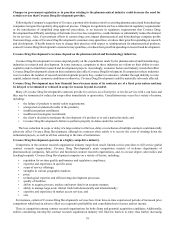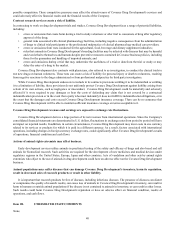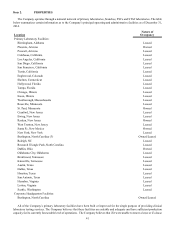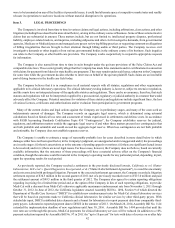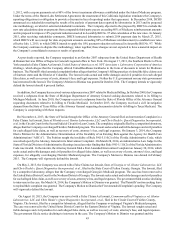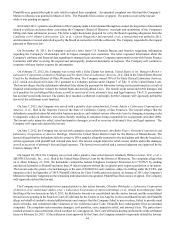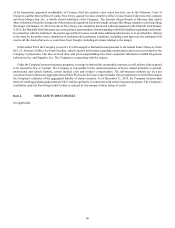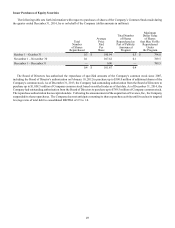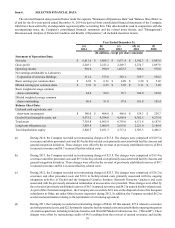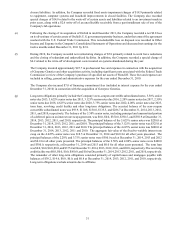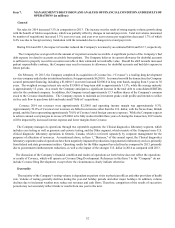LabCorp 2014 Annual Report Download - page 44
Download and view the complete annual report
Please find page 44 of the 2014 LabCorp annual report below. You can navigate through the pages in the report by either clicking on the pages listed below, or by using the keyword search tool below to find specific information within the annual report.42
were to be terminated on any of the facilities it presently leases, it could find alternate space at competitive market rates and readily
relocate its operations to such new locations without material disruption to its operations.
Item 3. LEGAL PROCEEDINGS
The Company is involved from time to time in various claims and legal actions, including arbitrations, class actions, and other
litigation (including those described in more detail below), arising in the ordinary course of business. Some of these actions involve
claims that are substantial in amount. These matters include, but are not limited to, intellectual property disputes, professional
liability, employee-related matters, and inquiries, including subpoenas and other civil investigative demands, from governmental
agencies, Medicare or Medicaid payers and managed care payers reviewing billing practices or requesting comment on allegations
of billing irregularities that are brought to their attention through billing audits or third parties. The Company receives civil
investigative demands or other inquiries from various governmental bodies in the ordinary course of its business. Such inquiries
can relate to the Company or other health care providers. The Company works cooperatively to respond to appropriate requests
for information.
The Company is also named from time to time in suits brought under the qui tam provisions of the False Claims Act and
comparable state laws. These suits typically allege that the Company has made false statements and/or certifications in connection
with claims for payment from federal or state health care programs. They may remain under seal (hence, unknown to the Company)
for some time while the government decides whether to intervene on behalf of the qui tam plaintiff. Such claims are an inevitable
part of doing business in the health care field today.
The Company believes that it is in compliance in all material respects with all statutes, regulations and other requirements
applicable to its clinical laboratory operations. The clinical laboratory testing industry is, however, subject to extensive regulation,
and the courts have not interpreted many of the applicable statutes and regulations. There can be no assurance, therefore, that such
statutes and regulations will not be interpreted or applied by a prosecutorial, regulatory or judicial authority in a manner that would
adversely affect the Company. Potential sanctions for violation of these statutes and regulations include significant fines, the loss
of various licenses, certificates and authorizations and/or exclusion from participation in government programs.
Many of the current claims and legal actions against the Company are in preliminary stages, and many of the cases seek an
indeterminate amount of damages. The Company records an aggregate legal reserve, which is determined using actuarial
calculations based on historical loss rates and assessment of trends experienced in settlements and defense costs. In accordance
with FASB Accounting Standards Codification Topic 450 “Contingencies”, the Company establishes reserves for judicial,
regulatory, and arbitration matters outside the aggregate legal reserve if and when those matters present loss contingencies that
are both probable and estimable and would exceed the aggregate legal reserve. When loss contingencies are not both probable
and estimable, the Company does not establish separate reserves.
The Company is unable to estimate a range of reasonably probable loss for cases described in more detail below in which
damages either have not been specified or, in the Company's judgment, are unsupported and/or exaggerated and (i) the proceedings
are in early stages; (ii) there is uncertainty as to the outcome of pending appeals or motions; (iii) there are significant factual issues
to be resolved; and/or (iv) there are novel legal issues. For these cases, however, the Company does not believe, based on currently
available information, that the outcomes of these proceedings will have a material adverse effect on the Company's financial
condition, though the outcomes could be material to the Company's operating results for any particular period, depending, in part,
upon the operating results for such period.
As previously reported, the Company reached a settlement in the previously disclosed lawsuit, California ex rel. Hunter
Laboratories, LLC et al. v. Quest Diagnostics Incorporated, et al. ("Hunter Labs Settlement Agreement"), to avoid the uncertainty
and costs associated with prolonged litigation. Pursuant to the executed settlement agreement, the Company recorded a litigation
settlement expense of $34.5 million in the second quarter of 2011 (net of a previously recorded reserve of $15.0 million) and paid
the settlement amount of $49.5 million in the third quarter of 2012. The Company also agreed to certain reporting obligations
regarding its pricing for a limited time period and, at the option of the Company in lieu of such reporting obligations, to provide
Medi-Cal with a discount from Medi-Cal's otherwise applicable maximum reimbursement rate from November 1, 2011 through
October 31, 2012. In June of 2012, the California legislature enacted Assembly Bill No. 1494, Section 9 of which directed the
Department of Health Care Services ("DHCS") to establish new reimbursement rates for Medi-Cal clinical laboratory services
that will be based on payments made to California clinical laboratories for similar services by other third-party payers. With
stakeholder input, DHCS established data elements and a format for laboratories to report payment data from comparable third-
party payers. Laboratories reported payment data to DHCS in the summer of 2013. On March 28, 2014, Assembly Bill No. 1124
extended the implementation deadline of new regulations until June 30, 2016. Assembly Bill No. 1494 provides that until the
new rates are set through this process, Medi-Cal payments for clinical laboratory services will be reduced (in addition to a 10%
payment reduction imposed by Assembly Bill No. 97 in 2011) by “up to 10 percent” for tests with dates of service on or after July


